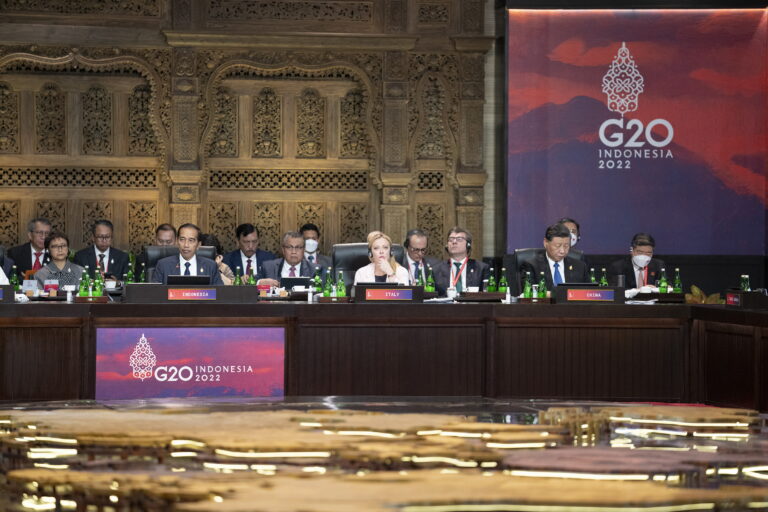In Bali, the leaders of the world’s major economies are seeking an understanding to avert a global recession. Putin is not there, but remains the stone guest.
‘It will be a tough race’. German Chancellor Olaf Scholz’s summary says a lot about the difficult negotiations underway at the G20 summit in Bali, Indonesia, where the leaders of the world’s most advanced economies will tackle hot topics such as inflation, energy, climate change, the food crisis and the war in Ukraine.
All dossiers on which the complicated relations between the West and China and Russia weigh particularly heavily.
Table of Contents
G20 summit: USA, China, Europe
It is no coincidence that the first day of work in Bali began with a face-to-face meeting between US President Joe Biden and Chinese President Xi Jinping. Who recently strengthened his leadership at the end of the Communist Party Congress. The two expressed their commitment ‘to keep the lines of communication open‘, adding that Washington and Beijing have a responsibility to ‘manage differences’ and avoid global conflicts.
The reference is clearly to what happened in Ukraine. But also to the risks of a war in the Pacific around Taiwan. Risks that for Europe could translate into further problems in the supply of raw materials and liquefied natural gas, exacerbating the contraction of the economy which, according to the latest EU Commission forecasts, is veering dangerously towards recession.
Germany, in particular, could close 2023 with a negative GDP change. And Chancellor Scholz is the most active in Europe in trying to protect trade relations with Beijing. His recent trip to China sparked controversy with his EU partners, particularly France, which did not like Scholz’s forward flight. Transalpine President Emmanuel Macron is expected to meet Xi Jinping in Bali. But, in a much reduced format compared to the honours Beijing paid to the German Chancellor. The meeting is expected to last just 20 minutes.
G20 summit: Russia and Ukraine
In addition to relations between the West and China, the issue of the war in Ukraine will inevitably hover on the negotiating tables in Bali. Even though the G20 is an economic, not a political forum, as Indonesian President Joko Widodo tried to remind us.
Russian President Vladimir Putin will not be at the summit, although Russia is part of the group. Putin, however, is expected to virtually attend at least one of the meetings. Hypotheses of a return of Kiev and Moscow to peace talks continue to reverberate. Envoys from Russia and the US are reportedly meeting in Turkey in these hours, while Ukrainian President Volodymyr Zelensky spoke of the beginning of the end of the war.
However, even though he is absent, Putin’s presence is being felt. The conclusions of the summit have been blocked by references to Russia.
For a West that presses to emphasise Moscow’s faults over the conflict and its consequences (inflation and energy crisis), there are other G20 bigwigs (China and India, but also Saudi Arabia) that do not share the hard fist towards Putin.
In particular, US and European partners would like to point out that Russia’s war has global economic repercussions that need to be addressed at the G20.
Inflation and recession
Behind the tug-of-war over Russia, there is clearly a global recession looming. The global economic outlook is ‘gloomier’, the IMF warned. The economy has weakened as downside risks materialise and looking ahead the challenges are ‘immense’.
On the subject of inflation, Western leaders are still seeking support to enact an oil price cap. Just as they are working to find solutions to food and fertiliser shortages. But for Europe there is also the gas issue to deal with. Without Russia, 2023 could be an even blacker year on the methane supply front
Connected to this, there is the debate on combating climate change. The still ongoing Cop27 in Egypt does not seem to proceed well. If developing countries asked for a billion-dollar fund to compensate richer ones for the economic damage of pollution, the answer so far has been negative.












